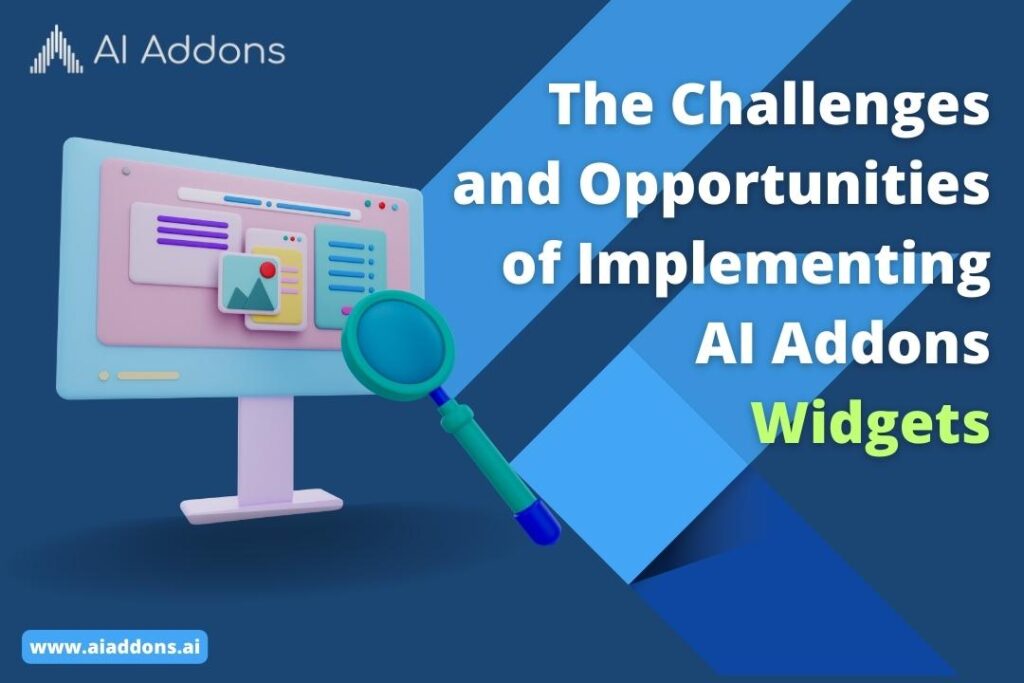Artificial Intelligence (AI) has emerged as a transformative technology, revolutionizing various industries and sectors. One of the areas where AI has made significant progress is in the development of Best Elementor Addon: AI Addons.
These widgets are designed to enhance the functionality and capabilities of existing software applications by incorporating AI algorithms and techniques. While the Best Elementor Addon: AI Addons widgets offer tremendous opportunities, their implementation also presents several challenges.

In this blog post, we will explore the challenges and opportunities associated with implementing AI add-ons widgets.
Understanding AI Add-ons Widgets:
AI add-ons widgets are software components that integrate AI capabilities into existing applications, offering users additional features and functionalities. These widgets leverage AI techniques such as machine learning, natural language processing, computer vision, and data analytics to provide advanced functionalities beyond what traditional software can offer. They can be used in various domains, including customer service, marketing, finance, healthcare, and more.
Opportunities for AI Add-ons Widgets:
- Enhanced User Experience:
AI add-ons widgets can greatly enhance the user experience by providing personalized recommendations, intelligent search capabilities, and predictive analytics. For example, an e-commerce website can implement an AI-powered recommendation widget that suggests products based on the user’s browsing history and preferences, leading to improved customer satisfaction and increased sales.
- Automation and Efficiency:
By incorporating AI add-ons widgets, businesses can automate repetitive tasks and streamline operations. AI-powered chatbots, for instance, can handle customer queries and provide instant support, reducing the need for human intervention. This automation not only improves efficiency but also allows businesses to allocate their human resources to more complex and strategic tasks.
- Data-Driven Insights:
AI add-ons widgets can analyze large volumes of data and extract meaningful insights. These insights can be used to make informed business decisions, identify patterns and trends, detect anomalies, and predict future outcomes. For instance, a financial institution can implement an AI-powered widget that also analyzes market data and provides real-time investment recommendations, empowering investors with data-driven insights.
- Scalability and Flexibility:
AI add-on widgets can be easily integrated into existing software applications, allowing businesses to scale and adapt their systems without significant reengineering efforts. This scalability and flexibility enable organizations to leverage the benefits of AI technologies without disrupting their existing infrastructure, reducing implementation time and costs.
Challenges of AI Add-ons Widgets:
- Data Quality and Availability:
AI algorithms heavily rely on high-quality and diverse data for training and inference. However, obtaining relevant and clean data can be a significant challenge. To ensure data compliance, data collection, labelling, and maintenance involve a lot of work, and privacy concerns must be handled. Additionally, some domains may lack sufficient data, making it difficult to train accurate AI models.
- Integration Complexity:
Integrating AI add-ons widgets with existing applications can be complex, especially when dealing with legacy systems or third-party software. Compatibility issues, API mismatches, and infrastructure requirements may pose hurdles during the integration process. Proper planning, documentation, and collaboration between development teams are crucial to overcome these challenges.
- Ethical and Legal Considerations:
AI add-ons widgets must comply with ethical and legal frameworks to ensure fair and responsible use. Privacy regulations, bias mitigation, transparency, and accountability are critical aspects that need to be addressed. The potential misuse of AI capabilities and the ethical implications of algorithmic decision-making are areas that demand careful consideration.
- Model Interpretability and Explainability:
As AI add-ons widgets become more sophisticated, ensuring transparency and interpretability of the underlying AI models becomes crucial. Users should have a clear understanding of how the models make predictions or decisions. To give consumers access to the inner workings of the model and let them assess and trust the findings, explainable AI techniques must be used.
Best Practices for Implementing AI Add-ons Widgets:
To overcome the challenges associated with implementing AI add-ons widgets, it is essential to follow certain best practices. Consider the following guidelines:
- Clearly Define Goals and Use Cases:
Before integrating Best Elementor Addon: AI Addons widgets, define clear objectives and use cases. Identify the specific problems or tasks you aim to address with AI capabilities. This will help you choose the right widgets and ensure that the implemented solution aligns with your business goals.
- Choose the Right AI Add-ons Widgets:
Select AI add-on widgets that are relevant to your domain and requirements. Consider factors such as accuracy, scalability, ease of integration, and support from the widget provider. Thoroughly evaluate different options and choose widgets that have a proven track record and positive user feedback.
- Ensure Data Quality and Accessibility:
Data is the backbone of AI algorithms. Ensure that you have access to high-quality, diverse, and properly labeled data. Implement data collection mechanisms and data cleaning processes to maintain data quality. Additionally, ensure that the data used for training and inference is securely stored and complies with relevant data protection regulations.
-
Plan for Integration and Compatibility:
Thoroughly plan the integration of AI add-ons widgets with your existing software infrastructure. Identify potential compatibility issues and design the integration process accordingly. Clearly document the APIs, dependencies, and system requirements to ensure smooth integration. Collaboration between development teams and effective communication with widget providers are key to overcoming integration challenges.
- Address Ethical and Legal Considerations:
Develop a comprehensive understanding of the ethical and legal implications of implementing AI add-ons widgets. Ensure compliance with privacy regulations and address issues related to bias, fairness, and transparency. Incorporate mechanisms to monitor and mitigate potential biases and regularly evaluate the ethical impact of your AI-enabled systems.
- Foster User Trust and Transparency:
Promote user trust by focusing on model interpretability and explainability. Provide users with insights into how AI models make decisions or predictions. Employ techniques such as model interpretability algorithms, visualization tools, and interactive interfaces to enhance user understanding. Transparent and explainable AI fosters user confidence and acceptance.
- Monitor Performance and Adapt:
Continuously monitor the performance of AI add-ons widgets to ensure their effectiveness and accuracy. Collect user feedback and analyze metrics to identify areas for improvement. Be prepared to adapt and update the widgets as new data becomes available or as user requirements evolve. Regular maintenance and updates are crucial to keep the widgets relevant and effective.
Conclusion:
Implementing Best Elementor Addon: AI Addons widgets offers numerous opportunities to enhance software applications with advanced AI capabilities. These widgets can improve user experience, automate tasks, provide data-driven insights, and offer scalability. However, the implementation process also comes with challenges, such as data quality, integration complexity, ethical considerations, and model interpretability.
By following the best practices, including setting clear goals, choosing the right widgets, ensuring data quality, addressing ethical concerns, and promoting transparency, businesses can successfully overcome these challenges and unlock the potential of Best Elementor Addon: AI Addons widgets. Embracing these opportunities can lead to increased efficiency, better decision-making, and improved user satisfaction in various domains and industries.
Follow AI Addons
Facebook:
https://www.facebook.com/aiaddons
Instagram:


